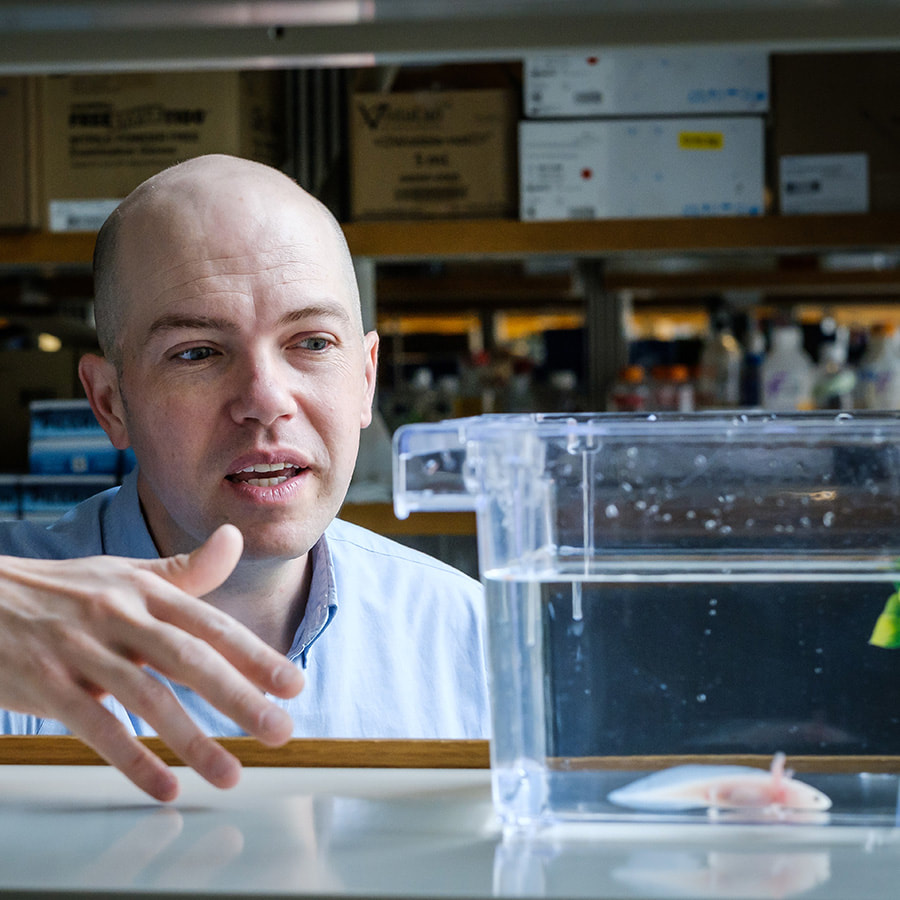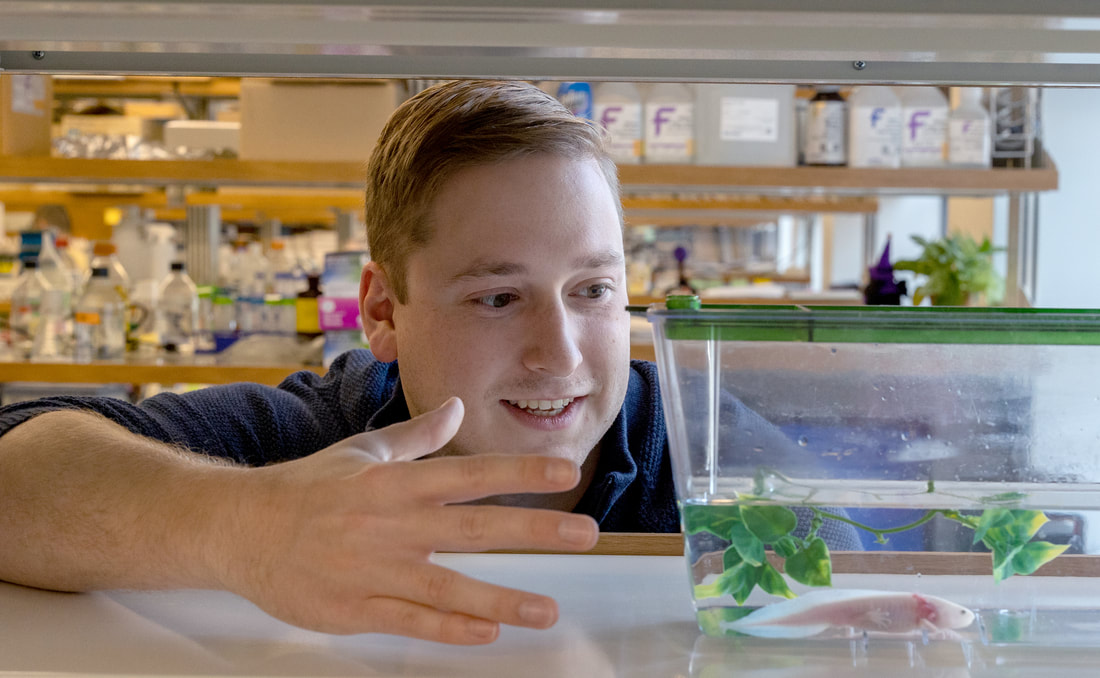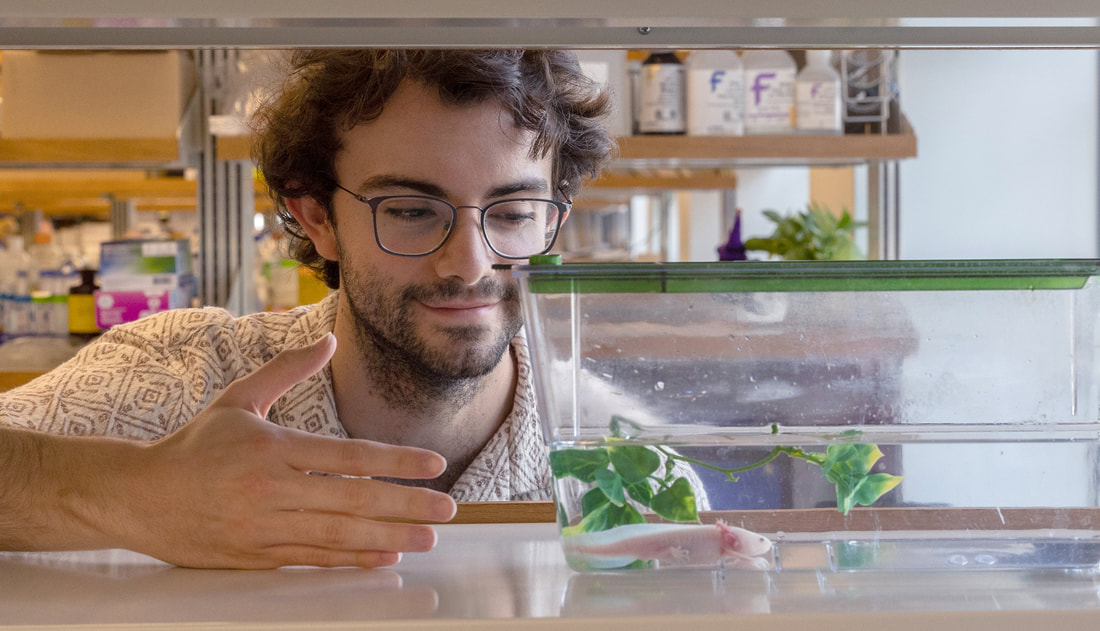About the PI - Josh Currie |
I'm a cell biologist fascinated with how cells and tissues can work together to perform extreme acts of regeneration.
I hail from the beautiful Cumberland Plateau of Tennessee, USA. I grew up totally enamored with animals and the living world, which lead me to study biology at Tennessee Technological University. Afterwards working as a Research Assistant in the lab of Alissa Weaver at Vanderbilt University, I got my first glimpse of moving cells under a microscope and developed a somewhat overzealous appreciation for the molecular cytoskeleton. For a PhD, I ventured to an epicenter of cytoskeletal cell biology (and college basketball), the University of North Carolina at Chapel Hill. At UNC I studied microtubule plus tip proteins (+TIPs) with Steve Rogers, dissecting the structural components of Drosophila +TIPs that regulate microtubule dynamics during processes like cell migration. At the end of my PhD, I decided to make a leap far afield from the climate and topic of my graduate work to study axolotl limb regeneration in the lab of Elly Tanaka at the Center for Regenerative Therapies in Dresden, Germany. It was a great match of expertise and question, since the axolotl system was poised to benefit from cutting edge molecular tools to study the cell biology of regeneration. |
Graduate Lab Members
Tim CurtisJacob BarrettUndergraduate Lab MembersElena Singer-FreemanHarry PanagopoulosSophie KingBaylor GoldthwaiteZinn Amos |
I grew up in the breathtaking Blue Ridge mountains of Roanoke, Virginia. My journey led me to Roanoke College for my undergraduate studies. While there, I had the incredible opportunity to work alongside Dr. Christopher Lassiter in their lab. I Investigated the profound impact of estrogenic compounds on tail fin regeneration in zebrafish. As I delved into this research, I found myself captivated by the intricate process of regeneration and the cues that coax cells into reshaping lost structures. This fascination set me on a path toward a PhD in the Currie lab. I'm now dedicated to unraveling the secrets behind signals that guide cells back to a "progenitor" state. This state is vital for orchestrating the development of all cell types in a regrown appendage. Beyond the lab's walls, I'm passionate about nurturing curiosity in the upcoming generation of scientists. Through engaging community outreach events, I aim to showcase the remarkable axolotl as a potent model for studying regeneration. When I'm not immersed in my research, you can find me scaling rock walls, exploring new literary worlds, playing videogames, or tending to my beloved garden.
|
Lab Alumni
Teija Bily |
4th year project student |
MD/PhD student, Western University, Canada |
Anastasia Liu |
4th year project student |
Medical student, Western University, Canada |
Qiuyuan Zhu |
4th year project student |
|
Christine Shan |
Co-supervised Master's student in Biomedical Communications |
Professional Science Illustrator (Portfolio website) |
Adline Metayer, MSc. |
Research Assistant |
|
Julio Garcia |
Senior undergraduate researcher |
Clinical Technician, Wake Forest Baptist Medical Center |
Rylee Kopchak |
Senior undergraduate researcher |
PhD student, Mayo Clinic |
Landon Bradshaw |
Senior undergraduate researcher |
Medical student, Stanford University |
Sean Jones |
Senior undergraduate researcher |
Technician, University of North Carolina at Chapel Hill |
Tommy Mehaffey |
Senior undergraduate researcher |
PhD student, Vanderbilt University |
Sam Leslie |
Senior undergraduate researcher |
PhD student, Brandeis University |
Halle Stump |
graduate student |
PhD student, Johnson lab @ WFU Biology |
Tuokai Zhang |
graduate student |
PhD student, WFU Biology |
We're hiring!
If you're excited about regeneration research, get in touch! We're looking for diverse, interdisciplinary group members at all levels - undergraduate, Masters, PhD, postdoctoral, and research technicians.
- Pro Tip: BEFORE emailing Josh, undergraduates students should read the "How to find a lab job" post under Resources & Links
- Trainees looking to do a Masters or PhD in the lab may apply through either the Wake Forest Biology Department (Biology Dept FAQ and the Graduate School application portal) or the Wake Forest School of Medicine (Biomedical graduate program page and the application How-to page). Interested students should contact Josh with a short introduction of your research interests and your CV.
- Postdocs should apply with a coverletter describing your prior experience and future interests and your CV.
- All student trainees should refer to the "Mentor/Mentee Expectations" .



